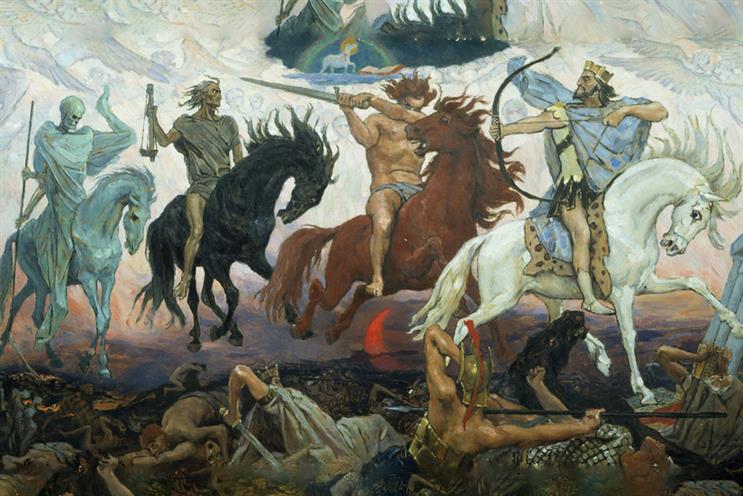Why? Because the so-called "four horseman of the apocalypse" are charging down the traditional ad business - and it’s going to be carnage out there, people.
Music, publishing, newspapers have already had their businesses hollowed out by the four horseman, otherwise known as web giants Google, Apple, Amazon and Facebook.
Last year, Facebook grew by 40.3% and Google by 12%, while all other media players were flat or in decline.
Indeed, Facebook, Google, Amazon and Apple combined grew by 20% last year, while the US economy as a whole grew just 2%. So who, apart from media players, was on the wrong end of that spectacular digital growth? You already know the answer. It’s advertising’s turn to get stiffed by the internet.
As professor of Marketing and Brand Strategy at the NYU Stern School of Business Scott Galloway declared last week, "The advertising-industrial complex is about to come to an end."
Last year WPP grew by 6.5%, Interpublic Group by 1.6% and Omnicom went into reverse, down -1.3%.
Ouch. Advertiser’s biggest clients are feeling the pinch too. Ninety per cent of the top 100 US consumer package goods brands – the guys who rely on brand advertising – lost market share, while 68% declined in sales.
One reason, says Galloway, is that if you are willing to pay, you can now easily avoid advertising. Sign up to Spotify and you can skip the ads. Buy a pricey iPhone and ad blockers are fitted as standard.
Download your favourite TV show from iTunes and you get it without the annoying ads. As Galloway puts it: "Advertising is becoming a tax only poor people pay."
Hang on Andy, you may say, live TV advertising is still going gangbusters. Perhaps, but the fact remains that digital advertising is ground zero for innovation in the ad business and there the game is dominated by our old friends, Facebook and Google. No one else gets a look in.
In fact, Facebook and Google control 50% of the entire global digital advertising business and every day they eat more share, says Galloway. Meanwhile, Fabrizio Freda, the head of Estee Lauder, said his fastest growing brands - MAC or Jo Malone or Le Mer or Bobbie Brown - were "not advertised in the traditional way."
So what can advertising do to fight Facebook? Well, right now, Facebook is growing faster than any business its size in the history of the modern world. They spend more on research and development than any tech company in history and their ad revenue is growing so fast they are actually taking share from Google itself. So what can the ad business do about that? If I knew the answer to that question…


